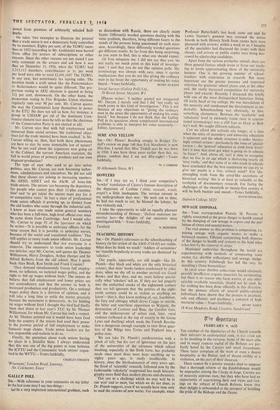TEACHING HISTORY
SIR,—Dr. Plumb's references to the schoolteaching of history (in his review of the EHD 1714-83) are risible. What does he think we teach? 'Addicts of certainties' we 'stumble hopelessly as cosy truths are shattered' by 'scholars.'
Our pupils, apparently, are still taught—like Dr. Plumb—that black and white are the only historical colours, that dons' books (unless condemned by other dons, when we shy off to another period) are Good Books, and that they, and we, must believe uncriti- cally what 'scholars' tell us. If they are led gingerly into the embattled smoke of the eighteenth century they are left ignorant that 'the politics of the eight- eenth century could be as violent as anything we know'—that is, they know nothing of, say, Jacobitism, the fury and obloquy which drove Craggs to suicide, the bitter and scurrilous opposition to Walpole, the destruction of Carteret and Bute, the Gordon riots, and 'the undercurrent of urban and, later, rural violence (reflected at the top of society in the Game Laws and duelling) which made the French Revolu- tion a dangerous enough example to turn three quar- ters of the Whigs into Tories and England into a police state.
We can take Dr. Plumb's condescension with a pinch of salt; but his sort of ignorance on the part of the universities of the advances which school teaching, especially in the Sixth form, has probably made since most dons were boys anything up to eighty years ago, is really insufferable. In history, since the Methodenstreit of sixty years ago, the flood of 'scientific' research:followed now by the fashionable 'scholarly' reappraisal has made historio- graphy more fluid than modern physics and chemistry.
This sets us a challenge which we may well be at our wits' end to meet, but which we do not shun, as Dr. Plumb suggests, even if we usually have time only to read the reviews of new works. For example, when
Professor Butterfield's last book came out and Sir Lewis Namicr's greatest was reissued the notice boards in both History Sixth form rooms here were plastered with reviews; within a week or so, I imagine all the specialists had discussed the issues with their classes, and private or public copies were being bor- rowed by scholarship candidates.
Apart from the various particular stimuli, there are three general factors which invite or force our teach- ing to levels approximating those of the university lecturer. One is the growing number of school- teachers with experience in research. But more important are the greater pressure and improved selection for grammar school places and, at the other end, the vastly increased competition for university places and awards. Recently I discussed this briefly with one of the most distinguished historians living, till lately head of my college. He was incredulous of the necessity and condemned the development as un- desirable. Schoolteaching was obviously, to him, something elementary. Between the 'academic' and 'scholastic' level (a curiously ironic twist in conven- tional terminology) was a cliff face as black as Bod- ley's wall. We taught different subjects.
Can we afford this attitude any longer, at a time when the unity of secondary and university education is apparent and the whole structure is under increas- ingly critical review--particularly the issue of special- isation r. the 'general' education at sixth form level? Isn't it time that dons got what is going on in schools 'in focus'? And, above all, isn't it time to recognise that we live in an age which is destroying nearly all 'cosy truths,' and that some of us who teach in schools have concluded that the best equipment we can try to give our pupils is a free, critical mind? For 'dis- entangling truth from the coral-like accretions of historical writing' this is at least as valuable as the toothpick of documentary research. For facing the challenges of the twentieth or twenty-first century it will be both buckler and sword.—Yours faithfully,


































 Previous page
Previous page